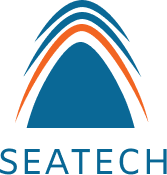SeaTech Horizon2020 Project
Next Generation Short-sea Ship Dual-Fuel Engine and Propulsion Retrofit Technologies
SeaTech Horizon2020 Project
Project Summary: The SeaTech consortium is proposing to develop two symbiotic ship engine and propulsion innovations, which when combined, lead to an increase of 30% in fuel efficiency and radical emission reductions of 99% for NOx, 99% for SOx, 46% for CO₂ and 94% for particulate matter. The innovations will be characterized by high retrofitability, maintainability and offer ship owners a return on investment of 400% due to fuel and operational cost savings. The proposed renewable-energy-based propulsion innovation is the bio-mimetic dynamic wing mounted at the ship bow to augment ship propulsion in moderate and higher sea states, capturing wave energy, producing extra thrust and damping ship motions. The proposed power generation innovation is based on the idea of achieving ultra-high energy conversion efficiency by precisely controlling the engine for achieving radically reduced emissions. The ultimate objective of the project is to scale up both technologies, demonstrate them in relevant environment and finally model the expected complementarities and synergy effects of deploying both innovations on a short-sea vessel scenario by extrapolating demonstration data with the help of a bespoke Advanced Data Analytics Framework. The project partners envisage to commercialize both symbiotic innovations in the European and Asian short-sea market by 2025, followed by the adjacent deep-sea market.Assuming only 10% of EU short-sea vessels would be retrofitted with SeaTech, this would result in CO₂ savings of 32.5 million tons annually, which equals the emissions of 200,000 passenger cars / year. Further impact includes savings of EUR 85.2 billion in health and climate change damages due to lower emissions, the creation of +100 jobs at the project partners with a cumulative net profit of EUR 820 million in the first 5 years post-commercialization, and the indirect creation of 250 new jobs in the EU shipyard industry.

The SeaTech consortium consists of large industry (Wärtsilä Finland / Netherlands and the Norwegian ship-owner Utkilen), two SMEs (Huygens Engineers from the Netherlands and Liewenthal from Estonia) and three universities (National Technical University of Athens, University of Southampton and UiT The Arctic University of Norway)

Project Updates
Website: http://www.seatech2020.eu
LinkedIn: https://lnkd.in/eXx9KTJ
Researchgate: https://lnkd.in/egvc3fc
Twitter: https://twitter.com/SeaTech2020